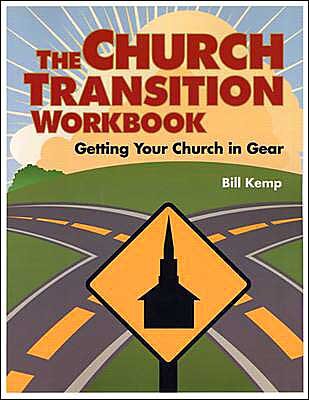Bill Kemp, The Church Transition Workbook: Getting Your Church in Gear. Discipleship Resources, 2004.
Referenced in:
LifeandLeadership.com Summary
Kemp is a church renewal specialist among United Methodists. This book is not focused strictly on small churches, but can serve as an excellent companion resource with Kemp’s other volume, Holy Places, Small Spaces: A Hopeful Future for the Small Membership Church. In The Church Transition Workbook, Kemp addresses the fact that churches are often the victim of ill-informed pastors who lead them through poorly managed change to adopt strategies that were never really well-suited to the context. This as well as a number of related crises can often result in intense conflicts, controversial pastoral terminations or even church splits and the aftermath of discouragement, distrust, and polarization. Even if a congregation experiences a non-crisis transition, such as the retirement of a beloved minister, the church needs sensitive and hopeful guidance to renew congregational spirit and restore hope.
This book is a comprehensive guide equipping the entire congregation to work together on renewal in ways that not only benefit the congregation but also rebuild trust in ministerial leadership. It is organized in short chapters followed by discussion starters and group exercises. It introduces the leading concepts in congregational development such as systems theory, change theory, transition management, size transitions, generational issues, etc. The entire process is spelled out in a one-year timeline.
From the Publisher
The Church Transition Workbook describes a step-by-step process that will enable the church to get moving again after traumatic conflict or being “run over by change.” It keeps laity and clergy on the same page as pastoral relationships are being redefined. Churches considering relocation or a radical shift in ministry will also find that the transition process complements their long-range visioning. Included in the book are stories, practical tools, and exercises that will help the church see its current reality and the possibilities for ministry.
This workbook will help churches that are going through a crisis, precipitated by:
- The loss of a pastor under difficult circumstances, such as clergy misconduct or death;
- The moving or retirement of a long-term pastor or of a pastor who micro-managed the church or failed to empower the laity;
- The sudden loss of church membership or a church split;
- A long-term pattern of declining resources;
- A change in community circumstances or the church’s neighborhood.
Audience: pastors, laity, district superintendents, conference leaders, and community developers.
In the author’s own words:
“This workbook is for church leaders, both lay and clergy. One of the great mistakes of our current era has been to provide clergy with a multitude of books, seminars, and other resources for church change, as if they alone could make things happen. Transition is an organic process, meaning it involves the whole congregation in a shift in activity and in self-understanding. With this in mind, this book was written so that it could be read by anyone who is concerned about the church’s future. The content of the book is arranged to support participation by each member of the congregation. This workbook is particularly designed to foster group discussion and to act as a shared resource for those church committees who find themselves riding herd on change. Who those committees are varies, depending on the nature of the transition and the way the local church is organized. Ideally each member of the church’s administrative council or governing board would read through this workbook, and then the council would assign appropriate chapters to the various committees and invite short-term study groups to work through its chapters. The idea is to percolate involvement in the process of transition down to the grassroots of the church.”
About the Author
Bill Kemp has served for twenty-four years as a United Methodist pastor in a variety of parish settings across three conferences and six districts. His current appointment as an intentional interim minister for the Western Pennsylvania Conference involves short-term ministry to churches that are experiencing conflict or unusual leadership needs.
***For additional information on this resource, including reviews, click the bookstore links. Check the reference at page top or the links below for resource guides on related topics.***
Related Areas
See Other Resources on Small Churches:
See Other Resources on Church Leadership and Renewal:
- Church Leadership and Renewal, Index
- Church Leadership, Theological Foundations, Ecclesiology
- Church Leadership, Philosophical Foundations – e.g. Church Growth, Missional, Emergent, and Other Missionally Responsive Trajectories
- Church Leadership, Practical Foundations – Church Dynamics and Research
- Church Leadership, Practical Foundations – Congregational Culture, Church Identity
- Church Leadership, Practical Foundations – Size Dynamics, Size Transitions
- Church Leadership, Practical Foundations – Research and Case Studies on Effective Churches
- Church Leadership, Special Situations – Small Church Development
- Church Leadership, Strategies for Renewal
See Resources on Over 100 Areas of Ministry Leadership:


